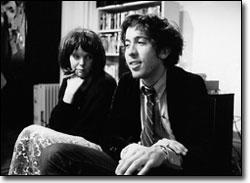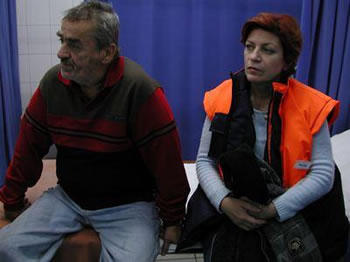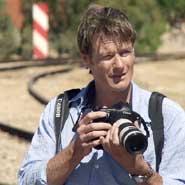41st Chicago International Film Festival - Part 2
 Mutual Appreciation - An almost documentary-realistic black and white film about a few ordinary 20-something NYC types, Mutual Appreciation is low-stakes storytelling done very well. With a great deal of humor, the film captures a certain milieu (I felt like I was back in my early twenties slacker days) with perfection. It almost doesn't feel like a story, the whole thing is so low-key. But there is a narrative, and it has to do with young adults negotiating their career and romantic confusions with honesty and a good deal of niceness. A group hug is actually used to resolve one dilemma, but the film doesn't feel as sappy as that might sound. Director Andrew Bujalski could be described as a less artistic or ambitious Richard Linklater. Real life musician Justin Rice (of the band Bishop Allen) is charming and clearly musically talented as a Dylanesque musician struggling to start a career. Turns out that Rice and Bujalski (who takes one of the leads) are long-time friends, as in the script, so Rachel Clift's extremely convinicing performance as Lawrence's girlfriend Ellie is that much more impressive (in q&a, the director opined that she had the toughest job). It's the film's realism and believeability that are its greatest strength and weakness--it would bore mainstream audiences, and it could be accused of navel-gazing, but underestimating a film this honest and sweet opens up hypocricies in any audience trying to be equally honest.
Mutual Appreciation - An almost documentary-realistic black and white film about a few ordinary 20-something NYC types, Mutual Appreciation is low-stakes storytelling done very well. With a great deal of humor, the film captures a certain milieu (I felt like I was back in my early twenties slacker days) with perfection. It almost doesn't feel like a story, the whole thing is so low-key. But there is a narrative, and it has to do with young adults negotiating their career and romantic confusions with honesty and a good deal of niceness. A group hug is actually used to resolve one dilemma, but the film doesn't feel as sappy as that might sound. Director Andrew Bujalski could be described as a less artistic or ambitious Richard Linklater. Real life musician Justin Rice (of the band Bishop Allen) is charming and clearly musically talented as a Dylanesque musician struggling to start a career. Turns out that Rice and Bujalski (who takes one of the leads) are long-time friends, as in the script, so Rachel Clift's extremely convinicing performance as Lawrence's girlfriend Ellie is that much more impressive (in q&a, the director opined that she had the toughest job). It's the film's realism and believeability that are its greatest strength and weakness--it would bore mainstream audiences, and it could be accused of navel-gazing, but underestimating a film this honest and sweet opens up hypocricies in any audience trying to be equally honest. Rating: 2 ½ out of 4 stars.
 Death of Mr. Lazarescu - The truth is that great film festivals are forums for films that are vulnerable in the commercial realm, films that aren't an easy sell. They may not be easy entertainments, but they're vital to the ecology of film. I'm not sure what to make of this 153-miunte, Romanian health care odyssey--it's clearly an important film, but it's punishing and unpleasant enough that it will have a hard time with word of mouth. The story is simple--an old man's health has deteriorated to a point where his suffering has caused him to ask for help. Along the way, his neighbors are involved and a nurse paramedic shepherds him to the best of her ability through a nightmare of bureaucracy, professional incompetence, systemic breakdown and compassion fatigue. The whole thing is done in close to real time (though it compresses roughly eight hours of night time into about two and a half), and you can't help feeling like an advocate for the ironically named Mr. Lazarescu by the end. After seeing the film, though, I'm still puzzling over fundamentals--the "death" of the title, the significance of certain episodes. If we can trust the diagnoses he receives, then he's going to die soon from one condition, even if the other were treated right away, so this character wasn't designed simply to make a point about the byzantine and malfunctioning health care system. He isn't held up as a Christ figure, but in the final scene he did remind me of Christ being taken down from the cross. Although the first two hours went by surprisingly easily (there's quite a bit of humor), in the last half hour the film became excruciating to me. And yet I respect that. Is it right to expect such a story to feel good? Should we receive catharsis or closure when the film wants us to think about the ongoing nightmare of modern health care? An artistic masterpiece? A work of social criticism? I'm not sure, so I won't even try to rate it, but experiencing art of this kind is important.
Death of Mr. Lazarescu - The truth is that great film festivals are forums for films that are vulnerable in the commercial realm, films that aren't an easy sell. They may not be easy entertainments, but they're vital to the ecology of film. I'm not sure what to make of this 153-miunte, Romanian health care odyssey--it's clearly an important film, but it's punishing and unpleasant enough that it will have a hard time with word of mouth. The story is simple--an old man's health has deteriorated to a point where his suffering has caused him to ask for help. Along the way, his neighbors are involved and a nurse paramedic shepherds him to the best of her ability through a nightmare of bureaucracy, professional incompetence, systemic breakdown and compassion fatigue. The whole thing is done in close to real time (though it compresses roughly eight hours of night time into about two and a half), and you can't help feeling like an advocate for the ironically named Mr. Lazarescu by the end. After seeing the film, though, I'm still puzzling over fundamentals--the "death" of the title, the significance of certain episodes. If we can trust the diagnoses he receives, then he's going to die soon from one condition, even if the other were treated right away, so this character wasn't designed simply to make a point about the byzantine and malfunctioning health care system. He isn't held up as a Christ figure, but in the final scene he did remind me of Christ being taken down from the cross. Although the first two hours went by surprisingly easily (there's quite a bit of humor), in the last half hour the film became excruciating to me. And yet I respect that. Is it right to expect such a story to feel good? Should we receive catharsis or closure when the film wants us to think about the ongoing nightmare of modern health care? An artistic masterpiece? A work of social criticism? I'm not sure, so I won't even try to rate it, but experiencing art of this kind is important.  Look Both Ways - Probably the most commercial film I saw at the festival, this little Australian film (look, ma, no subtitles!) struck me as a more modest variation of Magnolia, for better and for worse. (Speaking of Australia, Red joked that we may as well see it and get an early peek at the actors who'll be dominating Hollywood in coming years.) Director Sarah Watt's story focuses on characters dealing with the aftermath of a local train accident and a cancer diagnosis of one of the main characters--so why is it so funny? Justine Clarke plays an artist with a macabre imagination, who sees her (narrowly avoided) death in the most harmless of places. These musings are animated in a watercolor style that match her character's watercolor paintings. (These animated interludes remind me of films by Jane Campion, another director from down under.) Meanwhile, William McInnes, a news photographer, imagines his cancer--along with many other modern ills--in photo collages. Naturally, these kindred souls meet and begin a relationship, however ill-advised, of mutual need. (The sex scene between these two worry-warts is almost too hilarious.) There's more substance still in the secondary characters--unlike Mutual Appreciation, the filmmaker dares to have characters who aren't nice--and as meditations on life and death go, this one is quite enjoyable. It didn't tug at my heartstings as much as it could have, but perhaps that's because I've seen about nine other films this week. I thought this was much better than other recent Aussie imports, Lantana and Japanese Story. More than relevant to our post-9/11 lives, Look Both Ways is sure to get limited U.S. distribution. Trailer.
Look Both Ways - Probably the most commercial film I saw at the festival, this little Australian film (look, ma, no subtitles!) struck me as a more modest variation of Magnolia, for better and for worse. (Speaking of Australia, Red joked that we may as well see it and get an early peek at the actors who'll be dominating Hollywood in coming years.) Director Sarah Watt's story focuses on characters dealing with the aftermath of a local train accident and a cancer diagnosis of one of the main characters--so why is it so funny? Justine Clarke plays an artist with a macabre imagination, who sees her (narrowly avoided) death in the most harmless of places. These musings are animated in a watercolor style that match her character's watercolor paintings. (These animated interludes remind me of films by Jane Campion, another director from down under.) Meanwhile, William McInnes, a news photographer, imagines his cancer--along with many other modern ills--in photo collages. Naturally, these kindred souls meet and begin a relationship, however ill-advised, of mutual need. (The sex scene between these two worry-warts is almost too hilarious.) There's more substance still in the secondary characters--unlike Mutual Appreciation, the filmmaker dares to have characters who aren't nice--and as meditations on life and death go, this one is quite enjoyable. It didn't tug at my heartstings as much as it could have, but perhaps that's because I've seen about nine other films this week. I thought this was much better than other recent Aussie imports, Lantana and Japanese Story. More than relevant to our post-9/11 lives, Look Both Ways is sure to get limited U.S. distribution. Trailer. Rating: 3 out of 4 stars.
In other news, we were strolling and enjoying the sunshine Friday (ironically, our day off from the fest, and movies). We walked past hot dog stand The Wiener's Circle on Clark St. (known for their awesome french fries) in the middle of the afternoon, and who should I see sitting inside, staring right out towards the sidewalk? Jennifer Aniston and Vince Vaughn, only two of the most photographed and recognizable celebs of the year. Don't believe me? I'm not the only one who did a double-take.
Song: "Small Stakes" by Spoon (For Andrew Bujalski)


0 Comments:
Post a Comment
<< Home